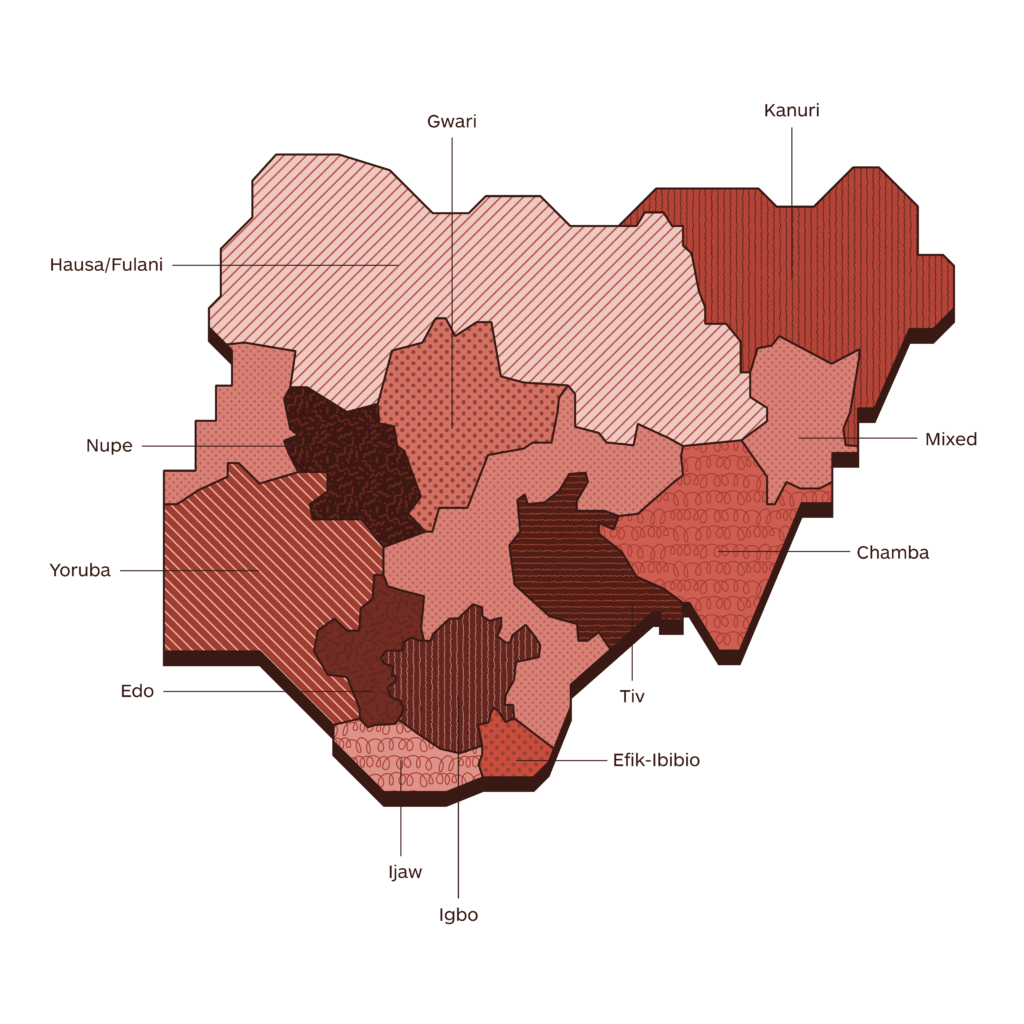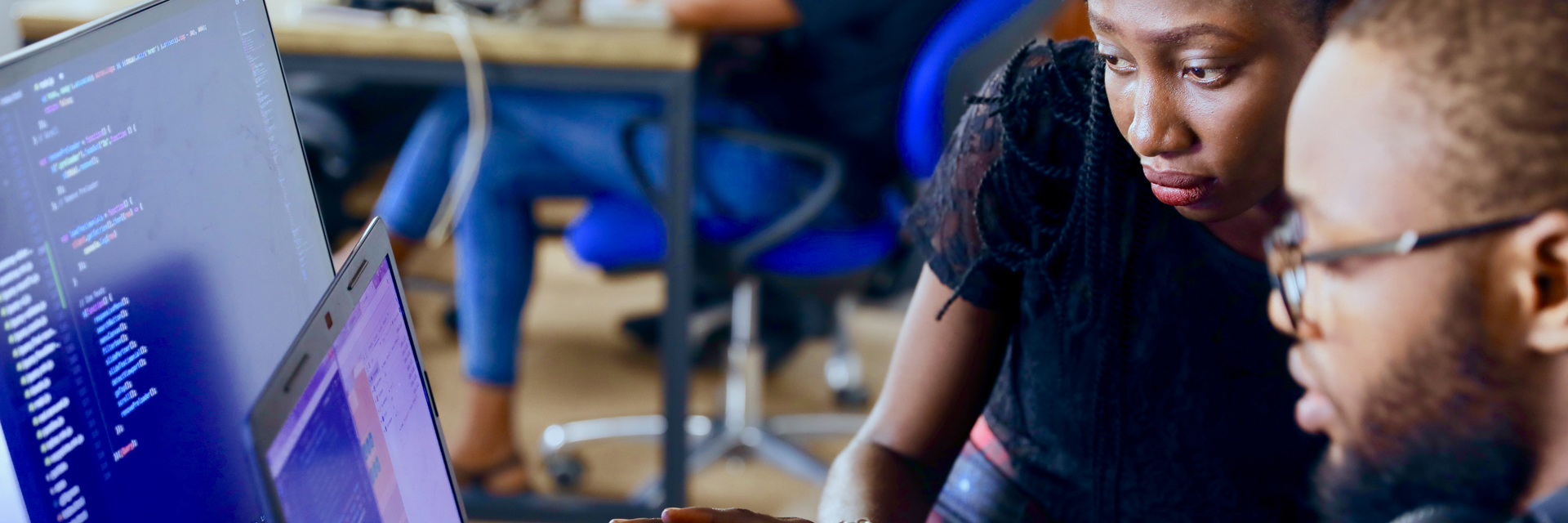Africa
To which language should you translate to localize in Nigeria?
What the 150 top websites do
Of the top 150 website (Global by design ranking):
- 65/150 translate into English.
- 4/150 translate into French.
- 1/150 translates into Nigerian Pidgin.
- 1/150 translates into the Nigerian Sign Language.
If you need others information, below you can find a selection of economic/social/cultural data
Overview
Language
Official language
English. Communication in the English language is much more popular in the country’s urban communities than it is in the rural areas, thanks to globalisation.
T-index
0.41%
T-Index ranks countries according to their potential for online sales.
Other languages
Hausa – is one of the regional languages used in Nigeria. The language is one of the largest in West Africa and it has an estimated 30 million native users while an additional 20 million people use the language as the second language.
Yoruba – is spoken by around 18.9 million Nigerians.
Igbo – is one of the most popular languages in Nigeria with an estimated 24 million native speakers, the majority of whom are members of the Igbo ethnic group.
Indigenous languages
Nigeria is home to hundreds of indigenous languages. In recent years, the federal government has been making efforts to promote the use of indigenous languages, many of which are endangered. Some of the indigenous languages spoken in Nigeria include Tiv, Kanuri, and Fulfulde.
English
High proficiency (EF) – 28 of 111 countries/regions in the world- 3/20 position in Africa.
Demography
Capital: Abuja
Currency: Nigerian naira
Population: 218,54 m
Population density: 234/km2
Economy
Nigeria is the largest economy not only in West Africa but across the wider continent. It accounted for 18.3% of total African GDP in 2020, the largest share of all countries.
GDP: 477.39 billion USD (2022)
GDP per capita: 2,184.4 USD (2022)
Exports: $57.7 billion (2021)
Statistics
Unemployment rate: 5.8% (2022)
Urbanisation: 54% (2022)
Literacy: 62% (2019)
Internet users: 55.4% penetration, 122.5 million
A quarter of Nigerians (27%) say that their device is a smartphone.
By 2025 more than 50% of SubSaharan Africa will have a mobile connection, of which 65% will have a smartphone. This will result in more than 475 million mobile internet users; the top three markets for smartphone users are projected to be Nigeria, South Africa, and Kenya.
Conventions
Numbering system
Arabic numbering system and point as decimal separator
Date format: dd – mm – yyyy
Time: 24h time system
Country code: 00234
Language data sources: Worldatlas/Britannica//EF/Wikipedia; Demography data sources: IMF/Worldometers; Conventions data source: Wikipedia; Economy data sources: WTO/OEC/CIA/Esomar/Datareportal; Statistics data sources: Datareportal/WorldBank/UN/UNESCO/CEIC/IMF/Culturalatlas/Commisceoglobal
Facts and data
Economy
Imports
$61.6 billion (2021). Refined Petroleum ($11.3B), Wheat ($3.32B), Cars ($2.42B), Packaged Medicaments ($972M), and Broadcasting Equipment ($934M), importing mostly from China ($21.9B), India ($4.75B), Netherlands ($4.58B), United States ($4.42B), and Belgium ($2.34B).
In 2021, Nigeria was the world’s biggest importer of Synthetic Filament Tow ($110M) and Equine and Bovine Hides ($56.8M).
Financial inclusion factors (over 15 years of age)
• 45.1% have an account with a financial institution
• 1.6% has a credit card
• 8.7% have a mobile money account
Ease of doing business
‘Mostly not free’ (56.9 out of 100) 17th out of 48 African countries 131st worldwide out of 190 countries (2022, Heritage Foundation and Wall Street Journal)
Exports
$57.7 billion (2021). Crude Petroleum ($41.8B), Petroleum Gas ($8.52B), Special Purpose Ships ($1.25B), Cocoa Beans ($779M), and Refined Petroleum ($667M), exporting mostly to India ($9.07B), Spain ($6.7B), United States ($3.69B), France ($3.32B), and China ($3.05B).
Main local online stores
Buyam.com.ng, Adibba.com, Ojashop.com, Mystore.com, Regalbuyer, Fouani.com, Gloo.ng, Gidimall.com.
Economic freedom
Medium, ease of conducting business is rated 53.9 out of 100, ranked 22nd out of 47 African countries, 124th worldwide out of 190 countries (2022, World Bank)
Global Innovation Index
Ranked 13th out of 27 Sub-Saharan countries, 114th out of 132 worldwide.
The Global Innovation Index captures the innovation
ecosystem performance of 132 economies and tracks the most recent global innovation trends.
Economy data sources: WTO/OEC/CIA/Esomar/Datareportal
Service Imports (2019)
Service Exports (2019)
Source: OEC
Historical Data Trade Imports
The following section uses historical trade data imports from partners of Nigeria.
Historical Data Trade Exports
The following section uses historical trade data exports from partners of Nigeria.
Source: OEC
The Top Export Opportunities for Nigeria by Relatedness
Relatedness measures the distance between a country's current exports and each product by showing only products that Nigeria is not specialized in.
Nigeria's Most Complex Exports
The Product Complexity Index (PCI) measures the knowledge intensity of a product by considering the knowledge intensity of its exporters.
Source: OEC
Nigeria's Most Specialized Products
Specialization is measured using Revealed Comparative Advantage (RCA), an index that takes the ratio between Nigeria observed and expected exports in each product.
Payments method accepted by digital platforms in Nigeria
Source: OEC
Sources: i2i
Market Growth Imports (2019)
This score represents the likelihood that the given country will start importing that product in the next few years. It forecasts the opening of a new specific market.
Market Growth Exports (2019)
This score represents the likelihood that the given country will start exporting that product in the next few years. It forecasts the opening of a new specific market.
Source: OEC

T-index
Reach most of the online purchasing power
T-Index ranks countries according to their potential for online sales. It estimates the market share of each country in relation to global e-commerce.
Try it nowMedia
Media language English
Information channels
Nigeria’s media scene is one of the liveliest in Africa. State radio and TV operate at federal and regional levels. All 36 states run at least one radio network and a TV station. There are hundreds of radio stations and terrestrial TV networks, as well as cable and direct-to-home satellite offerings. Radio is a key source of information. International broadcasters, including the BBC, are popular. However, rebroadcasting of foreign radio content is banned. State TV says it reaches tens of millions of viewers, while the main privately-owned networks are market leaders in some cities. There are more than 100 national and local press titles, some of them state-owned. They include well-respected dailies, tabloids and publications which champion ethnic interests. According to Reporters Without Borders (RSF), Nigeria is one of West Africa’s most dangerous and difficult countries for journalists, who are often threatened, subjected to physical violence, or denied access to information by officials and police. Boko Haram, a militant Islamist group, has threatened the media. The print media have been in sharp decline in recent years but there are still around 100 publications. They include well-respected dailies, tabloids and publications which champion ethnic interests.
The press
The Guardian – influential, Lagos-based privately-owned national daily
The Punch – privately-owned daily
Premium Times – Abuja-based daily
Daily Independent – Lagos State-based daily
Daily Trust – Abuja-based daily
Leadership – Abuja-based daily
Vanguard – Lagos-based, widely-read daily
This Day – widely-read Lagos-based daily
The Daily Sun – Lagos-based
Tell – news weekly
Television
Nigerian Television Authority (NTA) – state-run, operates scores of national, and regional stations; national services broadcast in English
AIT – private, owned by DAAR Communications, broadcasting in Lagos, Abuja and internationally via satellite
Silverbird TV – private, Lagos, Port Harcourt
Galaxy TV – private, western Nigeria
Channels TV – private
Radio
Federal Radio Corporation of Nigeria (FRCN) – state-run, operates in multiple languages
Ray Power – private, owned by DAAR Communications, runs music-based and speech-based FM stations
Freedom Radio – private, Kano
News agency
News Agency of Nigeria (NAN) – government-owned
Media data source: BBC

The power of media
By Luca De Biase
English is Nigeria’s language of power, but voices are rising in defense of linguistic heritage.Multi-awarded author and journalist Luca de Biase is a professor at Pisa University, innovation editor at Sole 24Ore newspaper and a Member of the Mission Assembly for Climate-Neutral and Smart Cities, amongst many other roles and achievements.
Read it nowInternet Data
Internet users
55.4% penetration, 122.5 million
Share of web traffic by device
83.59% mobile phones, 15.67% computers (laptops and desktops), 0.74% tablet devices.
Median speed of mobile Internet connection
19.84 Mbps
Median speed of fixed Internet connection
11.84 Mbps
Mobile connection as a percentage of total population: 87.7%
Percentage of mobile connections that are broadband (3G-5G): 83.5%
Most popular web search engines
Google (98.98%), Bing (0.82%),Yahoo (0.09%), Duckduckgo (0.05%), Yandex (0.02%), other (0.04%).
Most used social media
Facebook (48.36%), Twitter (22.5%), Instagram (15.32%), Pinterest (6.75%), YouTube (5.99%), Linkedin (0.61%), Reddit (0.24%), other (0.24%).
Internet data sources: Datareportal/Statcounter
Social statistics
Life expectancy
53 yrs (2021)
Current health expenditure
3.38% of GDP
CO2 emissions
0.5 metric tons per capita
Corruption perceptions Index
Nigeria scored 24 out of 100, ranked 150 out of 180 countries worldwide.
World Happiness Index
Nigeria ranked 118 out of 146 countries, with a score of 4.552.
Cultural Curiosities
With more than 1000 ethnicities, Nigeria’s culture is a truly intriguing mixture of different traditions and customs. As a whole, Nigerians are perceived as very emotional and warm people. When doing business, greetings are considered fundamental; they might be longer than the typical western handshake, and it is considered very rude to suddenly start discussing business, thus asking the “courtesy” questions beforehand is appreciated.
Social statistics sources: WorldBank/UN/UNESCO/CEIC/IMF
The Data Factbook is a work in progress project. Our community is helping us to fill it up always with new and updated data. Your contribution is precious. If you want to help us, please write your advices at imminent@translated.com
Languages research
Languages spoken in Nigeria
Hausa
Hausa is one of the regional languages used in Nigeria. The language is one of the largest in West Africa and it has an estimated 30 million native users while an additional 20 million people use the language as the second language. Hausa is a West Chadic language under the larger Chadic language group of the Afro-Asiatic language family. Hausa is made up of numerous geographically defined dialects, but only the Dauranchi and the Kananci dialects are recognized as the standard dialect of the language. The use of the language is also propagated by local media as well as international media such as Deutsche Welle, Voice of America as well The BBC. The Hausa language traditionally used the Arabic writing system, but in recent years the language has incorporated the use of the Latin alphabet. The Hausa people are one of the largest ethnic groups found in Africa as well as Nigeria. The Hausa people make up around 25% of the population of Nigeria.
Yoruba
The Yoruba language is spoken by around 18.9 million Nigerians. It is the native language of the Yoruba people, a people native to West Africa. The Yoruba language is a member of the Niger-Congo family. Yoruba is a tonal language and comprises of three tones, namely high, mid, and low. Yoruba also features many loan words from Arabic.
Igbo
Igbo is another regional language popularly used in Nigeria, particularly in the southeastern region of the country. The language is categorised under the Volta-Niger language group which is under the larger Niger-Congo language family. Igbo is one of the most popular languages in Nigeria with an estimated 24 million native speakers, the majority of whom are members of the Igbo ethnic group. There are more than 20 dialects of the Igbo language, but the standardised Igbo is based on Umuahia and Owerri dialects.
Indigenous languages in Nigeria
Nigeria is home to a diverse number of ethnic groups, thus it only make sense that it also hosts hundreds of indigenous languages. In recent years, the federal government has been making efforts to promote the use of indigenous languages, many of which are endangered. Some of the indigenous languages spoken in Nigeria include Tiv, Kanuri, and Fulfulde.

Legend
-
Chamba
-
Edo
-
Efik-Ibibio
-
Gwari
-
Hausa/Fulani
-
Igbo
-
Ijaw
-
Kanuri
-
Nupe
-
Tiv
-
Yoruba
-
Mixed
| Language | |
| English | 79,000,000 |
| Hausa | 27,000,000 |
| Yoruba | 18,850,000 |
| Igbo | 24,000,000 |
The geographical distribution of languages that you will find in the maps published in this section is a work in progress. Our community is helping us to fill it up with always new and updated data. Your contribution is precious. If you want to help us, please write to imminent.factbook@translated.com
Photo credit: Lagos Techie, Unsplash
